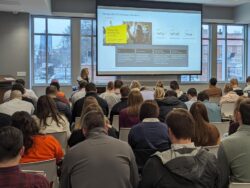
JP Price leads the audience of the Neel Corporate Governance Center’s Distinguished Speaker Series through a self-reflection exercise on best practices in Universal Design for Learning (UDL). Professors were encouraged to think about how their classes incorporate these learning strategies and students were encouraged to think through what they’d like to see more of in their classes.
Neuro-inclusion refers to welcoming and accommodating the many natural variations in how people’s brains take in, process and communicate information. As organizations strive to foster neuro-inclusive environments, they turn to specialists such as Jennifer “JP” Price, an assistant director and “neuro-inclusion champion” at EY in Chicago, for assistance. The Neel Corporate Governance Center, housed in the University of Tennessee, Knoxville, Haslam College of Business, recently hosted Price as part of its Distinguished Speakers Series.
How did you become involved in “neuro-inclusion champion” work?
For me, it started during the [COVID-19] pandemic. I joined [EY] in July 2021 as an assistant director in a department founded by Hiren Shukla. He had heard a stat that around 15 to 20 percent of the adult population identified as neurodivergent, and of that population, 80 percent were under- or unemployed. He wanted to see if he could make a neuro-friendly recruiting and retention program for us at EY. That was eight years ago in Philly, and that program is ever-evolving.
Could you please describe your current role?
A third of my role is a career counselor to tax professionals, software engineers and data analysts. The next third is ecosystem outreach engagements like our Distinguished Speaker Series talk at UT. Thanks again for having me. Lastly, I am informally a mentor to other disabled employees and colleagues as the Chicago lead of a Disabled Employee’s Business Resource Group. We call it AccessAbilities.
What are some of the most effective ways neurodivergent, or as you say, neuro-distinct people can advocate for themselves in the workplace?
Something I invited the talk’s attendees to do is start by getting to know themselves. Meaning, get to know their own thrive zones, their margins and what brings them close to burnout from a wellbeing standpoint. This way, they’ll be better able to articulate what they may want to request if they choose to call someone in to help them. When they make a request, they can choose to disclose their neurodivergence or not (e.g., “I process instructions better if they are communicated to me in writing versus in conversation”).
Given the broad range of neurodiversity, what are some of the most helpful accommodations employers can make to optimize their workplaces for neuro-inclusion?
Short answer: incorporate Universal Design for Learning (UDL) into communications, processes and culture. For more tips on UDL, please check out this two-page handout.
Who can students contact if they’d like to learn more about employment at EY?
The UT Knoxville lead recruiting contact is Brennan Pancer, available at Brennan.Pancer@ey.com.
–
CONTACT:
Stacy Estep, writer/publicist, sestep3@utk.edu

